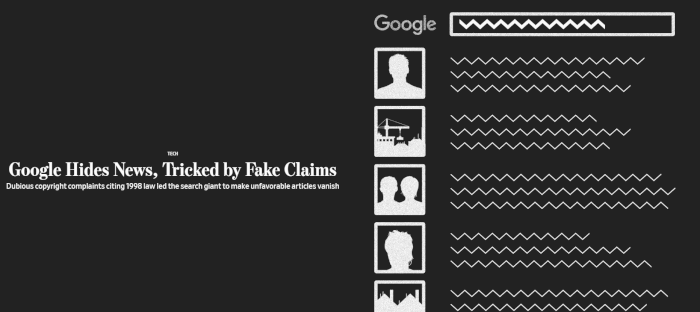Malicious Users Can Use Backdating and DMCA To Remove unfavourable Articles From Google
https://twitter.comI don’t think this comes as a surprise to a lot of us but The Wall Street Journal (paywall) identified hundreds of instances in which individuals or companies, often using apparently fake identities, caused Google to remove links to unfavourable articles and blog posts that alleged wrongdoing by convicted criminals, foreign officials and businesspeople in the U.S. and abroad.
A Google search, at one time, could locate a news article on a man accused of attempted child rape, another on someone charged with fraud and still others on Ukrainian politicians facing corruption allegations. Googling certain keywords in March would find an article detailing the movements of two coronavirus-infected British tourists in Vietnam and warning others who visited the same places to take precautions.
Then the stories vanished.
Google stopped listing them in searches after it received formal requests that it scrub links to the pieces, a Wall Street Journal investigation found. When Google erases links to an article in its search engine, it is often the equivalent of wiping the piece from the internet, even though the item may still exist on a little-trafficked website. Searchers won’t see a trace.
Google’s system was set up to comply with the Digital Millennium Copyright Act, or DMCA. The 1998 law gives tech firms immunity from claims in copyright cases as long they quickly take down copyrighted material once alerted. Google has automated much of the process of reviewing takedown requests, relying on techniques that don’t require human review, to enable removals at a large scale.
The problem comes in when someone wanting Google to hide a webpage will find a little-trafficked blog and post a copy of the content from the legitimate webpage. After backdating the plagiarized post, the complainant will file an electronic notice with Google claiming the real article is a copyright violation.
Backdating also appeared to trick Google into purging the article on the two Britons with Covid-19. The story appeared on a Vietnamese-government affiliated news website on March 9, naming the hotel, bars and restaurants the tourists visited and urging readers who patronized the establishments to take precautions.
Google removed search links to the Vietnamese-language article after someone identifying as Long Hoang filed a complaint claiming the piece violated the copyright on an identical blog post about the tourists dated October 20, 2019, more than four months before the unnamed Britons visited. The blog consists of only eight posts, all cited in copyright complaints filed with Google. The complainant and news site didn’t respond to inquiries.
After the Journal brought the example to Google’s attention in May, Google reinstated the link, as well as more than 100 others it said were related to other abusive submitters.


